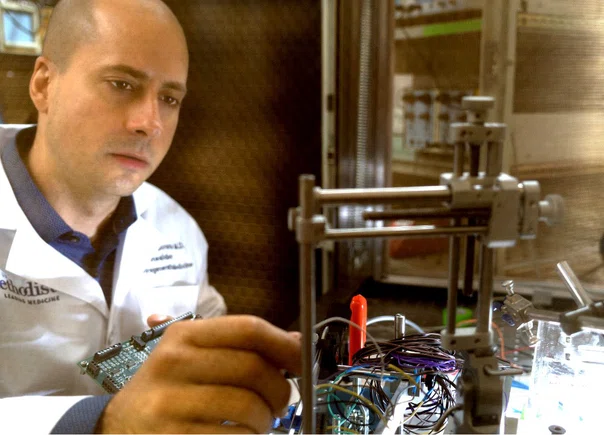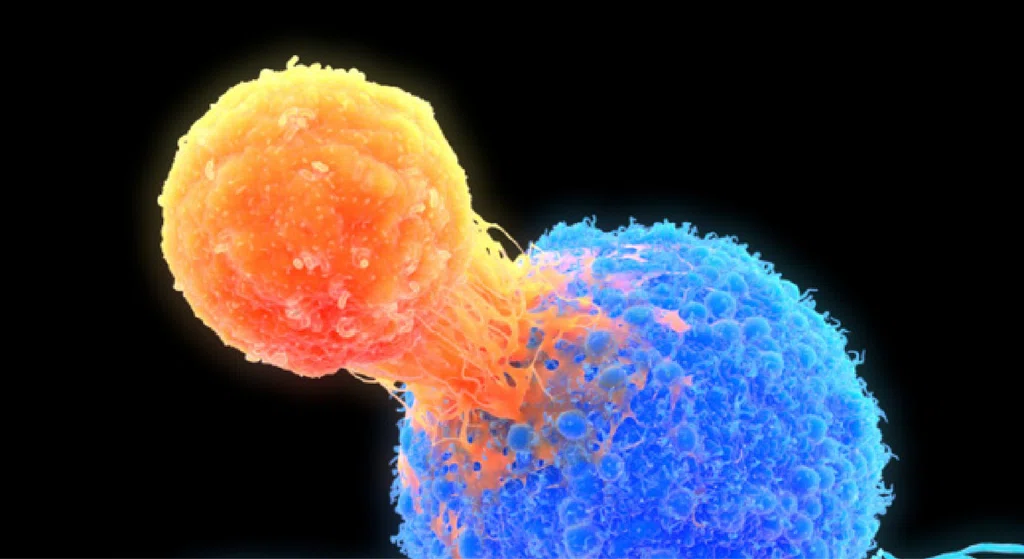
President’s letter
2020 Metrics
Cycle of Translation
Visionary Gifts

Discovery to Clinic

Innovative Education

Translational Luminaries
Introduction
The Ann Kimbell and John W. Johnson Center for Cellular Therapeutics
The Fondren Food & Health Alliance and The Fondren Inflammation Center
Cockrell Center for Advanced Therapeutics
Paula and Joseph C. “Rusty” Walter III Translational Research Initiative
Jerold B. Katz Academy of Translational Research
result
Outcomes Research
Precision Medicine
CPRIT Funding to Drive New Discoveries in Cancer Therapeutics
Siemens Healthineers and Houston Methodist Imaging Innovation Hub Empowers Researchers to Push the Boundaries
Novel Monoclonal Antibody Treatment Halts Tumor Growth in Deadly Ovarian and Pancreatic Cancers
Houston Methodist Institute for Technology, Innovation & Education (MITIESM)
Can Devices Provide A New Treatment Option for Glioblastoma?
Houston Methodist Hospital’s new Paula and Joseph C. “Rusty” Walter III Tower offers the Most advanced treatments and innovations available
Neuroimaging Offers New Insights into Neurodegeneration
COVID-19 Studies
Restorative Medicine
Houston Methodist and Rice University Launch Center for Translational Neural Prosthetics and Interfaces
Non-invasive Spinal Stimulation Enables Paralyzed People to Stand Unassisted
Dissolvable Implants Enhance the Body’s Ability to Heal Broken Bones
Cell Encapsulation May Hold the Key to Preventing Cell Transplant Rejection
Revolutionizing the Future of Complex Valve Disease Management



Science in Service
of
Medicineresult
President's letter
2020 Metrics
Cycle of Translation
Visionary Gifts of Hope


Introduction

The Ann Kimbell and John W. Johnson Center for Cellular Therapeutics

The Fondren Food & Health Alliance and The Fondren Inflammation Center

Cockrell Center for Advanced Therapeutics

Paula and Joseph C. “Rusty” Walter III Translational Research Initiative

Jerold B. Katz Academy of Translational Research

From Discovery to Clinic


Introduction

Restorative Medicine


Houston Methodist and Rice University Launch Center for Translational Neural Prosthetics and Interfaces

Non-invasive Spinal Stimulation Enables Paralyzed People to Stand Unassisted

Dissolvable Implants Enhance the Body’s Ability to Heal Broken Bones

Cell Encapsulation May Hold the Key to Preventing Cell Transplant Rejection

Revolutionizing the Future of Complex Valve Disease Management

Precision Medicine


CPRIT Funding to Drive New Discoveries in Cancer Therapeutics


An Innovative New Tool to Enable Drug Discovery and Personalized Medicine


Devising a Novel Combination Treatment for Aggressive Double-hit Lymphoma



Expanding the RNAcore to Encompass the Entire Cycle of a Cure


Siemens Healthineers and Houston Methodist Imaging Innovation Hub Empowers Researchers to Push the Boundaries

Novel Monoclonal Antibody Treatment Halts Tumor Growth in Deadly Ovarian and Pancreatic Cancers

Houston Methodist Institute for Technology, Innovation & Education (MITIESM)


Surgical Technology Developed in MITIE Gains FDA Approval


Pushing the Frontier of the Robotics Revolution

Can Devices Provide A New Treatment Option for Glioblastoma?

Houston Methodist Hospital’s new Paula and Joseph C. “Rusty” Walter III Tower offers the Most advanced treatments and innovations available

Neuroimaging Offers New Insights into Neurodegeneration

Translational Luminaries

CPRIT Funding to Drive New Discoveries in Cancer Therapeutics


Three Houston Methodist researchers have received funding from The Cancer Prevention and Research Institute of Texas (CPRIT) to address critical gaps in cancer research and therapeutics. Grants were awarded to facilitate the development of a novel organoid platform and the therapeutic efficacy of a new combination therapy for treating the aggressive doublehit lymphoma or DHL cancer.
01
An Innovative New Tool to Enable Drug Discovery and Personalized Medicine

A High Impact/High Risk Award from CPRIT is facilitating the development of a novel organoid platform – a mini-brain model that mimics glioblastoma, one of the deadliest forms of brain cancer.
With a new High Impact/High Risk Award from CPRIT, Robert C. Krencik, PhD, assistant professor of neurosurgery, is developing a reproducible and physiologically accurate model of human glioblastoma by incorporating patient-specific glioblastoma stem cells within three-dimensional spheres of human neural cells. This model can be utilized as a tool to screen drugs and test the effectiveness of potential treatment options for glioblastoma and other brain cancers. Using glioblastoma stem cells from individual patients will also enable a personalized approach to treatment selection.

“This platform will not only serve as an important tool for drug discovery and personalized medicine, it will also enhance our understanding of cell interactions within the glioblastoma microenvironment.”
Robert C. Krencik, PhD
02
Devising a Novel Combination Treatment for Aggressive Double-hit Lymphoma


Yulin Li, MD, PhD
Assistant Professor of Immunotherapy in Oncology, Yulin Li, MD, PhD, received CPRIT funding to investigate the therapeutic efficacy of a new combination therapy for treating the aggressive double-hit lymphoma or DHL cancer.
DHL simultaneously activates multiple cancer-causing oncogenes, making it very difficult to treat with frontline chemotherapy. While inactivating oncogenes with targeted therapy effectively kills tumor cells, this effect is limited by relapse and treatment resistance. In contrast, immunotherapies can provide a long-term survival benefit but are less effective with DHL because of reduced expression of the common anti-cancer immunotherapy, CD20. Li believes that combining the treatment approaches in a targeted therapy that suppresses oncogenes together with anti-CD20 immunotherapy holds great promise.

If successful, this approach may lead to a new paradigm of coupling targeted suppression of multiple oncogenes with simultaneous engagement of the immune system.
- Yulin Li, MD, PhD
03
Expanding the RNAcore to Encompass the Entire Cycle of a Cure

A third CPRIT grant awarded Houston Methodist $4 million to further the RNAcore’s evolution from a research and clinical-grade RNA provider to the only academic group in the U.S. to provide integrated RNA therapeutics services that span from the conception of an idea to commercialization.
Read more

More from Discovery to Clinic













